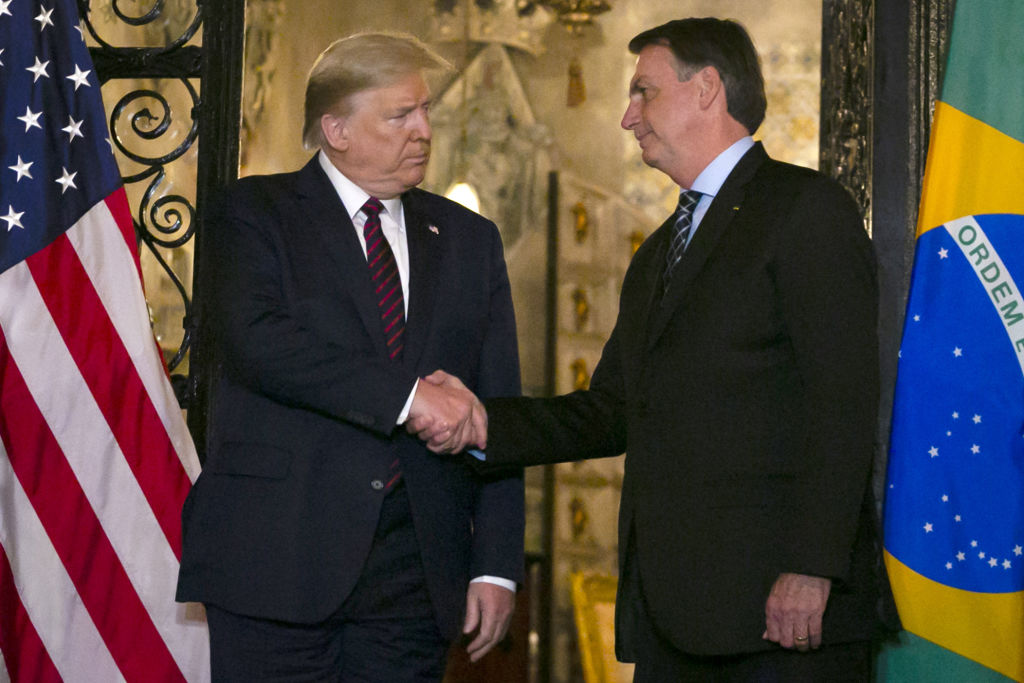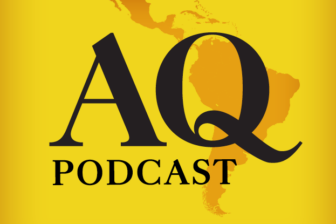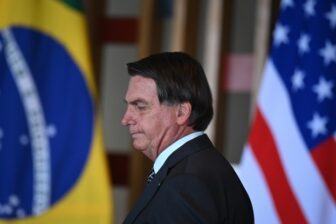Jair Bolsonaro has bought 210 million tickets aboard the USS Trump, and is determined to sail himself and his fellow Brazilians wherever it goes — even if it’s to the bottom of the sea. That’s the inescapable conclusion from the past week, which has seen Brazil’s president, his family and his foreign minister double down on what they see as a pro-Christian, anti-globalist alliance whose power project will not be diminished merely because of a “stolen” (their word) election. The implications for the Amazon, Brazil’s place in the world and its relationship with Joe Biden are still coming into focus – but they are enormous.
Bolsonaro has proudly called Trump his “idol,” and their relationship is genuine and deeply held – if somewhat one-sided. Trump’s 2016 election was instrumental in legitimizing a certain brand of swaggering conservatism, and other -isms, that Bolsonaro would openly copy two years later. Republicans enjoyed having a tropical outpost for their ideas, even if they struggled to understand it. “Is Bolsonaro getting the immigration problem under control?” a well-known U.S. conservative once asked me. I explained that less than 0.5% of Brazil’s population was foreign-born. “Well,” he said with a chuckle, “at least they won’t have to worry about that one.”
Trump was always more popular in certain capitals, especially in Latin America, than his critics admitted. But after the outcome of the Nov. 3 election became clear, even Trump’s most ardent fans quickly found the off-ramp. Colombian President Iván Duque, some of whose party members vocally backed Trump during the campaign in South Florida, immediately congratulated Biden for his victory. Israel’s Benjamin Netanyahu and Hungary’s Viktor Orbán did the same. The calculus was obvious: Their country’s broader interests with the United States took precedent.
Not in Brasília. By the time Bolsonaro recognized Biden’s win on Dec. 15, the only significant remaining holdout was Kim Jong-Un in North Korea. Even after Wednesday’s bloody insurrection at the Capitol, and all but the hardest-core Republicans abandoned Trump’s quest to overturn the election, Brazil’s president continued to speak of “shameless fraud.” His son Eduardo, who is also the head of the Foreign Affairs committee in Congress’ House of Deputies, not only met with Ivanka Trump last week – but did so inside the White House with Brazil’s ambassador by his side, raising eyebrows all over Washington. When Donald Trump was banned from Twitter, Eduardo Bolsonaro said he was “permanently” changing his profile photo to that of the US president. Foreign Minister Ernesto Araújo went where even Ted Cruz didn’t dare, condemning violence but adding in the same breath that those questioning the election were “good citizens … who shouldn’t be called fascists.”
What does it all mean?
Everyone knows a confrontation is coming between Biden and Bolsonaro over the Amazon, where deforestation is at 12-year highs, as well as other issues including human rights. As recently as October, I believed the bilateral relationship would be tense, no doubt, but with opportunities for cooperation on issues like China, regional security and the $105 billion in annual trade that both governments have recently sought to expand. With Bolsonaro already treated as a pariah in many Western European capitals, and increasingly shunned by his Latin American peers as well, he seemed likely to seek at least cordial ties with the United States. Biden, for reasons of both personality and realpolitik, wasn’t going to hold a grudge – or back him into a corner.
But today Bolsonaro seems ready — even eager — to accept isolation. He and his most loyal followers really do see themselves as visionary soldiers in a global battle against socialism and other ills, and if Brasília is to become the hemisphere’s sole remaining outpost, so much the better. “It’s fantastic,” one supporter recently told me. “He now becomes the global leader.” In domestic politics, Bolsonaro is betting the confrontation will help him rally his base at a time when he remains relatively popular, but vulnerable, with an emergency aid program that buttressed his popularity extinguished as of Jan. 1, COVID-19 cases spiking once again and Brazil lagging its peers on rollout of the vaccine. In the international sphere, Araújo and others have advocated building out ties with Japan, India — and, yes, Russia.
The question is whether Bolsonaro’s countrymen really want to come with him on this voyage. Brazil’s economy has been stagnant or shrinking for more than a decade, and it needs all the export markets, foreign investors and goodwill it can possibly get. An even noisier year of confrontation over the Amazon and other issues, and increasingly skeptical faces in places like the House Foreign Affairs Committee, will chase away investment while scuttling hopes for further trade deals and, potentially, Brazil’s accession to the OECD. Many Brazilian business leaders, particularly those in agribusiness who stand to suffer most from consumer boycotts, are watching all this in utter terror,hoping they or the military might still convince Bolsonaro to change tack. But the window is closing.
Most Brazilians elected Bolsonaro for three reasons: To revive the economy, to crack down on corruption, and to reduce violent crime. Most couldn’t tell you about Antonio Gramsci, the “Great Reset” or any of the other causes that most animate Araújo and his peers. If progress in those three areas remains meager or non-existent, Brazilian voters, including the business community, may well decide all the other stuff isn’t worth it, and seek a calmer, less divisive face in 2022. Bolsonaro certainly wouldn’t be the first leader to misunderstand why he was really elected — or overestimate his own ability to stay in power.









